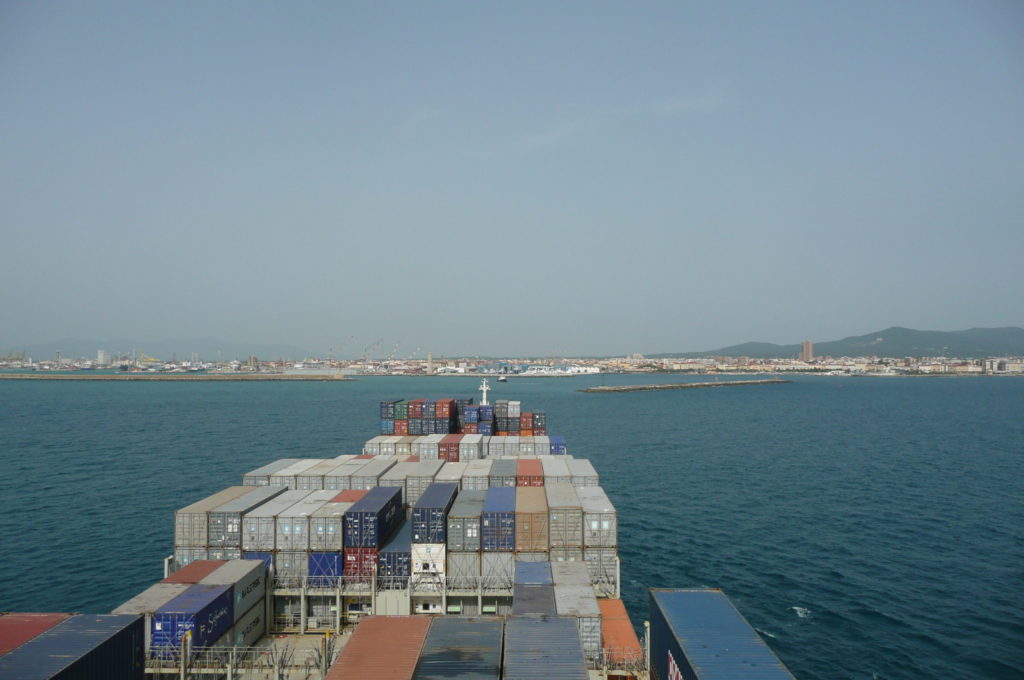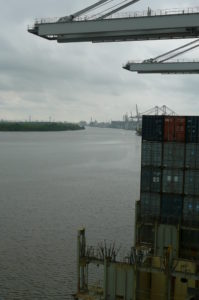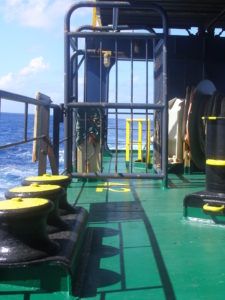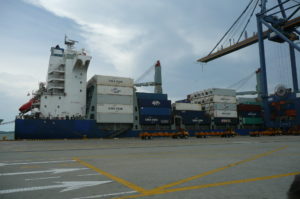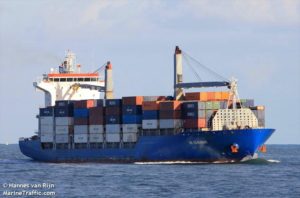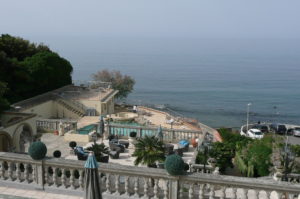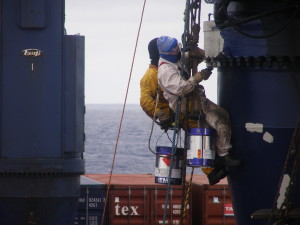In one case technical — and I am NOT a techie — but the engine room tour on my first freighter voyage begged to be described. It was sensory overload — far too many details — and without creating endless lists of things, the challenge was to make it interesting, speed it up and come to a crashing finish. Tell me if you think it works:
The Grand Event yesterday was our engine room tour, guided by the voluble Chief Engineer, Karlo. It was one of the most impressive sights any of us had ever seen (although hot and noisy, even with earmuffs). From the keel to the topmost access hatch, it rises 10 stories high, and aft-to-forward takes up 30% of the entire hull – add in the fuel storage tanks along either bulkhead, and it uses up more space than the cargo hold.
Lila had the good sense to bring along a notebook, and her jottings added to my memory and a further interview with the Chief, produced some remarkable statistics. The eight-cylinder twin-turbo-charged main engine produces 35,000 horsepower at 91 rpm, and Karlo assured us that newer ships (this one is only nine years old) can produce up to 105,000. To convey the scale of this monster, we saw two new replacement pistons hanging aft of the engine, still wrapped in plastic, each measuring five meters high, and we were told that the 7.5 meter diameter propeller weighs 45 metric tons.
At full speed, the Louise burns 110 tons of fuel a day, on “economy speed” 70, at $350 to $400 U.S. per ton. Depending on conditions – currents, depth, wind and weather – it takes an hour and a half to move this fully-loaded ship up to her maximum speed of 23.5 knots per hour. That’s a lot of inertia. I didn’t ask how long it takes to come to a full stop.
Because bunker fuel is as thick as asphalt, it needs to be purified by means of an on-board centrifuge and then heated at 145C. to the correct viscosity before it can be burned. The sludge that remains after purification is pumped into tanker trucks in port. No unprocessed fuel, oil, or bilge contents go into the ocean. (Neither does sewage.) Because of European and West Coast U.S. environmental regulations, in addition to the 3,500 tons of bunker the ship has to carry low-sulphur fuel for use in those ports, as well as gasoline to use dockside. With her tanks topped up, the Louise has a range of 15,000 nautical miles.
In addition to the main engine, there are four diesel-run generators, producing 440 volts at 60 cycles for a total potential of six megawatts (newer ships can produce up to 6,600 volts) and a desalinization plant that produces 25 tons of water a day. This multi-staged water-maker, which includes mineralizing and treatment with ultraviolet light, produces all the water used on board for cooling, hydraulics, plumbing and human consumption. The Louise takes on no fresh water in port.
Impressive also was the workshop and spare parts storage, including every kind of machine tool, a huge lathe, untold numbers of hand-tools – each in its numbered slot on the walls – shelf after shelf of steel boxes filled with every kind of fitting the ship’s engineers could possibly need, paints, chemicals, and numberless drums of oil. As Karlo pointed out, there’s no handy machine shop out here in the middle of the Pacific. He described for us, too, all the backed-up back-up systems for running the show, all computerized and far too complicated to recount.
In that vast space amid the hellish din of so many thousands of mechanical parts moving simultaneously at high speeds, surrounded by a labyrinthine complexity of ladders and hatches, kilometers of insulated wires and pipes snaking in every direction, valves, blowers, boilers, turbines, turbo-chargers, condensers, a steering gear the size of two small farm tractors, air compressors, a seawater central cooling system, block-and-tackle for moving heavy equipment around, and a 3,300 volt bow-thruster – with that enormous, panting, thrumming monster-engine at its heart – the steel planks vibrating beneath our feet with the eternal beat of the ship, the three of us stood open-mouthed in awe.
Anyone who writes faces a particular challenge with sunrises and sunsets, because it is so easy to fall into the cliche trap. How to be original? How to make the reader share in the wonder? Here’s an attempt:
I woke early and pulled the curtain back from the porthole in time to see the sky just pearling up before sunrise. I quickly dressed and climbed to my usual perch on the top step to F Deck, facing aft, a little northeasterly. It was slow in coming. First a faint pink lined the clouds, then a golden light gradually deepened along the horizon, and puffs of cloud over the indigo water turned from mauve, to rose, to bright pink. The horizon clouds opened to form a rose-tinged bowl, scalloped like a seashell, and suddenly the sunlight poured into this bowl like molten gold, too brilliant to look at. I watched for half an hour, at the end of which I fully felt the blessing of this diurnal gift to the planet.
Both these pieces are excerpted from Letters from the Pacific, my first travel memoir.
© Sandra Shaw Homer, 2017
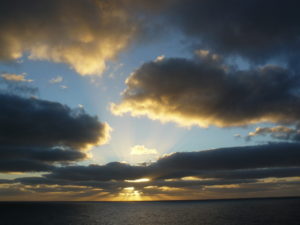
Photo by SSH

